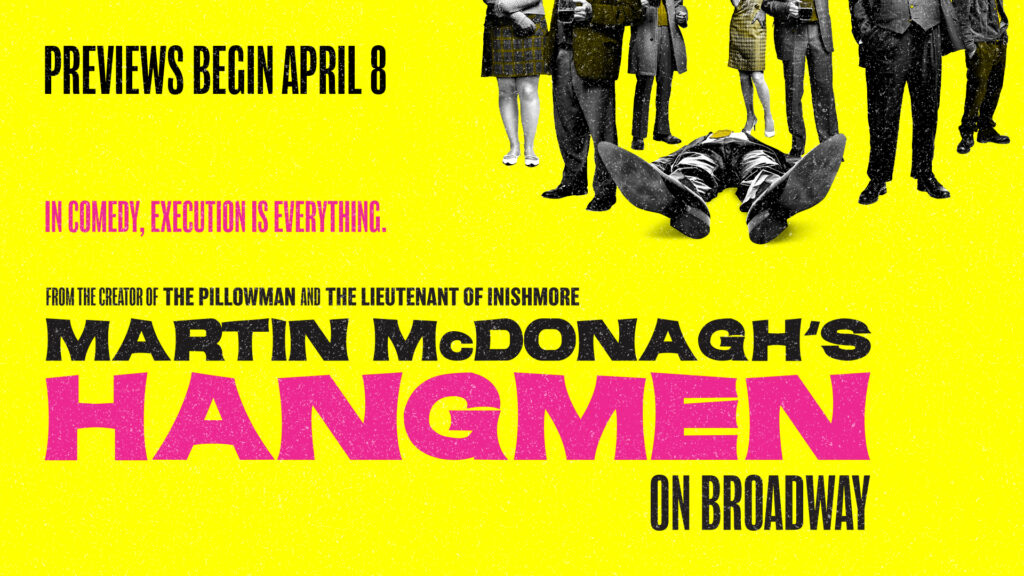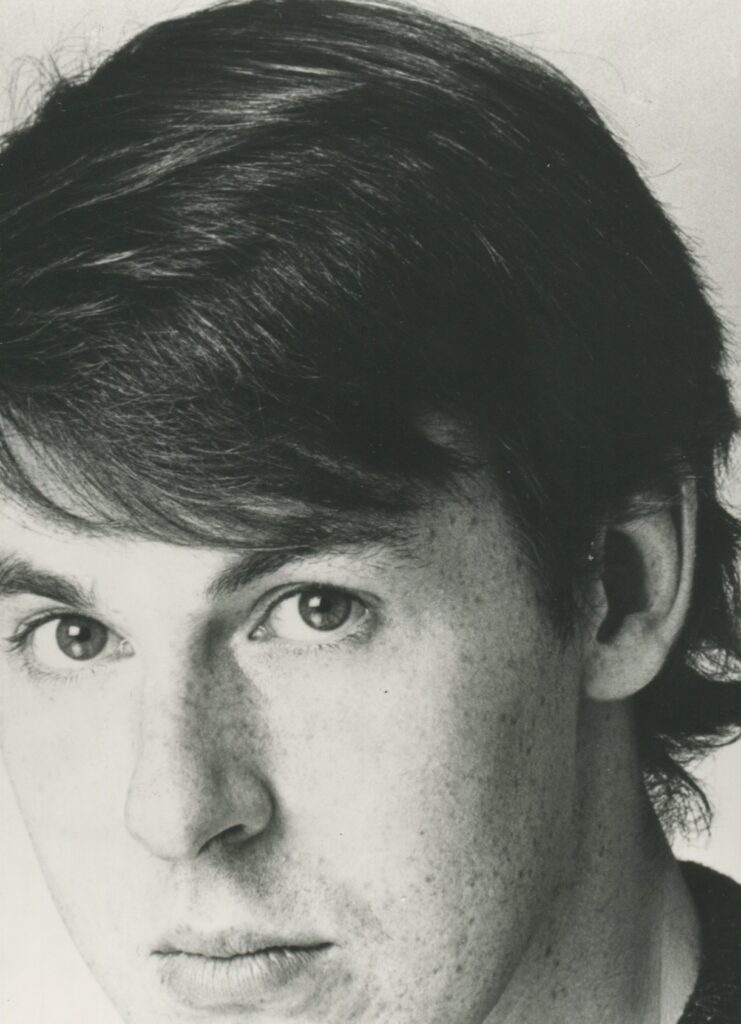
The image above says it all.
Or does it…?
This represents the third attempt to open this spectacular play on Broadway. I am not on a percentage, let me make that clear, but I urge you to snap up tickets at covid-induced discounts asap. After all, capital punishment – what could be funnier?
Following a hugely successful run at The Atlantic Theatre in 2018 a transfer to Broadway was mooted. Some of the cast had availability issues and the transfer never happened.
Then in 2020 the transfer was finally placed and with some new cast members the project got as far as a week and a half of previews (but no opening) and then … well we all know what happened on March 13th of that year.
So now in 2022 – wish us luck.
I am engaged to cover several roles including ‘Harry’ one of the hangmen of the title, Hangmen. I was in the company when the shutdown hit, and at that time my wife (the amazing Patricia Conolly) was appearing as Mrs Dubose in To Kill A Mockingbird in a theatre around the corner. So it seemed not only obviously sensible for me to take the gig but also practical as Patricia had Manhattan housing supplied.
So I was delighted when this came around again, not least because it was a 5 block walk to work.
But then …
Mockingbird closed at two days notice and the Manhattan apartment evaporated.
Mockingbird is slated to return in June of this year. (We all hope).
Talking of Mockingbird and the cover gig (see here for my previous take). In the weeks after Christmas last year the virus went through the company meaning that covering actors were deployed, not only those current, but those from previous casts.
Such is the challenge of keeping a show open in the present situation that public praise has been lavished on the many several covers and swings that have kept Broadway and West End shows going – this was unthinkable back in the day when Noel Langley wrote the backstage novel “There’s a Porpoise Close Behind Us.” In that novel he details in one sentence the disdain verging on contempt in which understudies were held in 1936.
So in 2022 it is heartening to note that on so mighty an organ as NPR I heard a conversation explaining that while the job is more artisanal than directly artistic, it requires skill, courage, more than a little nerve, and the firm management of one’s ego.
I understand that given the virus and what it’s doing to the world at large and actors in particular, my own and my colleagues’ odds of ‘going on’ have risen and bookies in New York midtown are laying bets at better than even chances: who knows? But if you live in NYC don’t be surprised if I ask you for a sofa for the night!
In other McPhillamy news allow me to direct your attention to a charming little radio series by Collin Johnson under the umbrella title, Capital Gains. The BBC plans to re-broadcast this amusing piece beginning February 10th of this year. You can access it at BBC Radio 4 Extra.
Oddly enough, the chap who wrote this, one Collin Johnson was also an actor (like me). He is on record as repeating a phrase first uttered by William Makepeace Thackeray who, when asked why he wrote Vanity Fair, (the 19th century novel, not the hi-glamour magazine), answered, “Bread and cheese.”
Apparently Johnson, soon after he became a young father, motivated by this very same imperative, took on a succession of cover jobs in the West End. I understand that he used to regard the income from these engagements as a writing bursary. This may be apocryphal but I have heard that Capital Gains was written in a broom cupboard adjacent to a dressing room at the Duchess Theatre in London using a large upturned photographic placard of a certain television star balanced on two trestles as a desk.


Are these men related? I think we should be told.
Full disclosure, Collin Johnson is known to me personally.
6 replies on “Hangmen – Third Time is the Charm”
Hooray! May many couches be needed and furnished! I know both of these men personally and miss the sight of them very much. Be brilliant….
Greetings and blessings to you dear friend (from both of us!)
ah the smooth-cheeked acorn and full-grown beardy oak x
Couldn’t have put it better myself!
Your reference to Thackeray put me in mind of the closing line, also cf our conversation on Zoom last night:
Ah! Vanitas Vanitatum! which of us is happy in this world? Which of us has his desire? or, having it, is satisfied?—come, children, let us shut up the box and the puppets, for our play is played out.
Maybe one more roll of the dice before the puppets are all put away.
And, also the ending of the Gore Vidal “Eleanor” essay:
“To read of Eleanor and Franklin is to weep at what we have lost. Gone is the ancient American sense that whatever is wrong with human society can be put right by human action. Eleanor never stopped believing this. A simple faith, no doubt simplistic—but it gave her a stoic serenity. On the funeral train from Georgia to Washington, “I lay in my berth all night with the window shade up, looking out at the countryside he had loved and watching the faces of the people at stations, and even at the crossroads, who came to pay their last tribute all through the night. The only recollection I clearly have is thinking about “The Lonesome Train,” the musical poem about Lincoln’s death (‘A lonesome train on a lonesome track / Seven coaches painted black / A slow train, a quiet train / Carrying Lincoln home again….’). I had always liked it so well—and now this was so much like it.”
I had other thoughts in 1962 at Hyde Park as I stood alongside the thirty-third, the thirty-fourth, the thirty-fifth, and the thirty-sixth Presidents of the United States, not to mention all the remaining figures of the Roosevelt era who had assembled for her funeral (unlike Proust’s golden figures in his last chapter, they all looked if not smaller than life, smaller than legend—so many shrunken march of time dolls soon to be put away). Whether or not one thought of Eleanor Roosevelt as a world ombudsman or as a chronic explainer or as a scourge of the selfish, she was like no one else in her usefulness. As the box containing her went past me, I thought, well, that’s that. We’re really on our own now.”
See https://www.nybooks.com/articles/1971/11/18/eleanor/
A more than interesting comment which gives rise to thoughts and associations in return. Not to mention material for future posts!